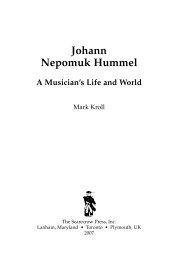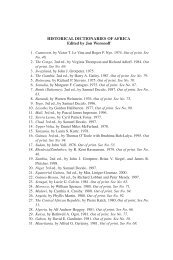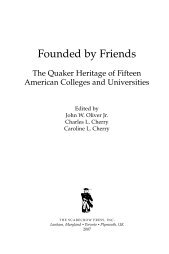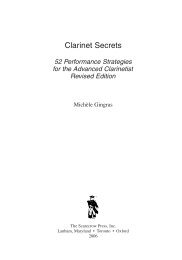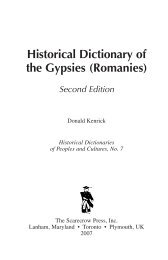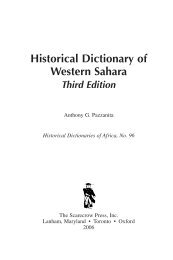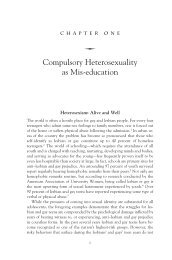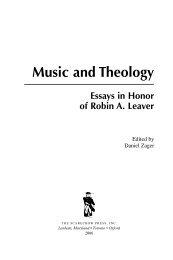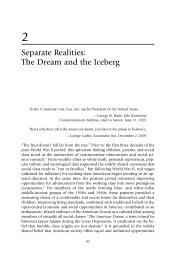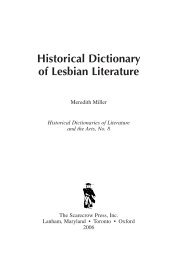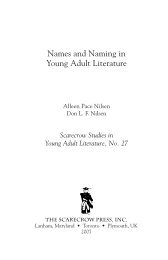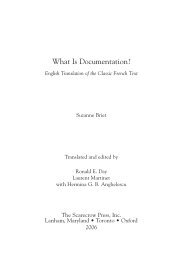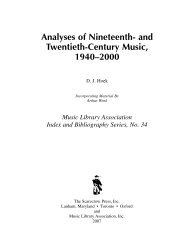Postwar German Cinema and the Horror Film - Scarecrow Press
Postwar German Cinema and the Horror Film - Scarecrow Press
Postwar German Cinema and the Horror Film - Scarecrow Press
You also want an ePaper? Increase the reach of your titles
YUMPU automatically turns print PDFs into web optimized ePapers that Google loves.
viii Steffen Hantke<br />
Critical consensus among historians of <strong>German</strong> film concedes that <strong>the</strong>re<br />
may be postwar <strong>German</strong> horror films, but insists that <strong>the</strong>re is no postwar <strong>German</strong><br />
horror film. In o<strong>the</strong>r words, critics are to acknowledge <strong>the</strong> existence of individual<br />
horror films, even of horror film cycles, but <strong>the</strong>y refuse to acknowledge that<br />
<strong>the</strong>se films add up to what can be called a genre. Their refusal to take <strong>the</strong> argumentative<br />
leap from <strong>the</strong> specific to <strong>the</strong> general, <strong>and</strong> <strong>the</strong> arguments delivered in<br />
support of this hesitation, makes for a story so compelling that it is well worth<br />
recounting.<br />
There used to be <strong>German</strong> horror film before <strong>the</strong> advent of <strong>the</strong> Third Reich,<br />
or so <strong>the</strong> story goes. These were <strong>the</strong> golden days of <strong>German</strong> expressionist filmmaking.<br />
But this flourishing of <strong>the</strong> genre came to an end with <strong>the</strong> Nazis, who,<br />
like o<strong>the</strong>r totalitarian regimes of <strong>the</strong> 20th century that exercised absolute control<br />
over <strong>the</strong>ir respective national film industries, had no interest in <strong>the</strong> horror genre<br />
or were actively opposed to it. Joseph Goebbels’ Reichspropag<strong>and</strong>aministerium<br />
(Ministry of Propag<strong>and</strong>a) was opposed to <strong>the</strong> “degenerate” excesses of <strong>German</strong><br />
expressionism, its brooding introspection, its conflicted view of <strong>the</strong> human condition.<br />
At <strong>the</strong> movies, <strong>the</strong> Nazis preferred <strong>the</strong> light entertainment of costume <strong>and</strong><br />
period drama, which would distract <strong>the</strong> population from politics <strong>and</strong> <strong>the</strong> increasingly<br />
terrifying realities of <strong>the</strong> war. Streamlining popular culture, <strong>the</strong> Nazis put<br />
an end to horror film during <strong>the</strong> twelve years of <strong>the</strong> Third Reich. Their efforts to<br />
root out <strong>the</strong> genre were so successful that, once <strong>the</strong> Zero Hour had passed <strong>and</strong><br />
<strong>the</strong> film industries began to reconstitute <strong>the</strong>mselves in East <strong>and</strong> West <strong>German</strong>y,<br />
historical continuity had been severed. For a variety of reasons, both economic<br />
<strong>and</strong> ideological, <strong>the</strong>re was no going back to prewar <strong>German</strong> cinema, no recovery<br />
of cinematic traditions. As <strong>the</strong> <strong>German</strong> film industry started to pick itself up<br />
from <strong>the</strong> rubble, <strong>the</strong> desire for distraction from <strong>the</strong> harsh realities of <strong>the</strong> historical<br />
moment, which used to be officially prescribed during <strong>the</strong> Third Reich,<br />
found itself confirmed <strong>and</strong> justified yet again. “The ‘rubble films’ of 1947–49<br />
fit in with that down-to-earth positivistic model for ‘coping with <strong>the</strong> past’ that<br />
<strong>the</strong> Allies offered to <strong>the</strong> <strong>German</strong>s; <strong>the</strong>y relieved <strong>the</strong>m of <strong>the</strong> task of radical selfanalysis<br />
<strong>and</strong> thoroughgoing revisionism” (Kreimeier 377). <strong>Horror</strong> films, which<br />
appear to be relatively useless for such conciliatory politics, were no part of <strong>the</strong><br />
production schedules. As it turned out, this condition was to be permanent. In<br />
effect, up to <strong>the</strong> present day, <strong>the</strong> horror film genre in <strong>German</strong>y never recovered<br />
from having been so rudely interrupted at <strong>the</strong> height of its achievements. Every<br />
now <strong>and</strong> <strong>the</strong>n, someone will make a film that qualifies as a horror film; occasionally,<br />
a horror film will hit upon a formula successful enough to initiate a<br />
cinematic cycle. But nei<strong>the</strong>r <strong>the</strong> quantity nor quality of <strong>the</strong>se films justifies regarding<br />
<strong>the</strong>m as elements functioning within <strong>the</strong> conceptual framework of genre.<br />
They remain statistical anomalies. They don’t add up. Or so <strong>the</strong> story goes.<br />
My goal in this introduction is not to steer head on against <strong>the</strong> flow of this<br />
historical narrative, trying to disprove or dismiss it altoge<strong>the</strong>r. For that, <strong>the</strong> narrative<br />
is too convincing, just as its authors have invested far more time <strong>and</strong><br />
scholarly attention in its construction than I can possibly muster for <strong>the</strong> purpose



